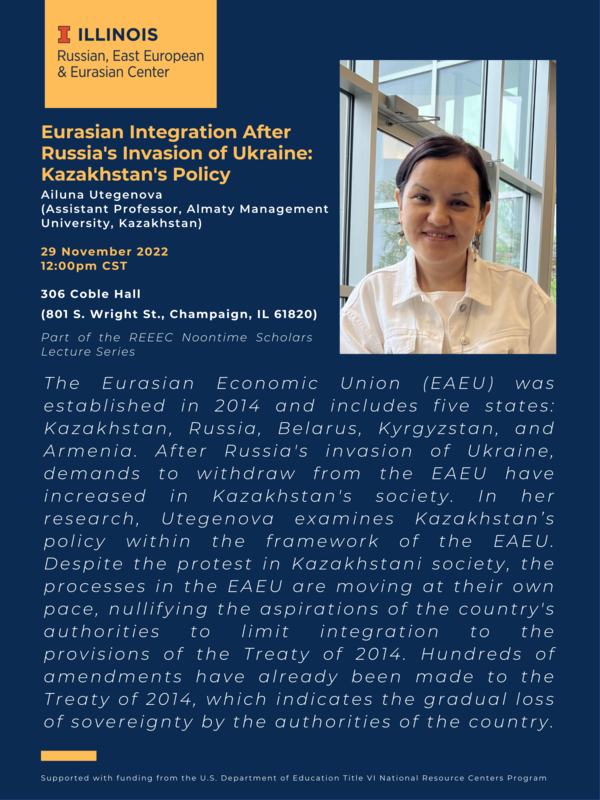REEEC Noontime Scholars Lecture: Ailuna Utegenova, "Eurasian Integration After Russia's Invasion of Ukraine: Kazakhstan's Policy"

- Sponsor
- REEEC
- Speaker
- Ailuna Utegenova
- Cost
- Free and open to the public.
- Contact
- REEEC
- reec@illinois.edu
- Views
- 208
The Eurasian Economic Union (EAEU) was established in 2014 and includes five states: Kazakhstan, Russia, Belarus, Kyrgyzstan and Armenia. The Concept of Foreign Policy of Kazakhstan for 2020-2030 states that integration within the EAEU would be carried out only within the framework of the Treaty on the Establishment of the EAEU of May 29, 2014. However, processes within the EAEU have been going beyond the scope of the Treaty, spreading on more and more areas that are not considered in the Treaty of 2014. Thus, by 2025, the EAEU five member-countries plan to complete the formation of a common energy market, a common financial market, and the aim of creating a common educational space is also being discussed.
After Russia's invasion of Ukraine, demands to withdraw from the EAEU have increased in Kazakhstan’s society. There had been protests against the EAEU in Kazakhstan at the time of signing the treaty in 2014, but this year the voices of opponents of Kazakhstan's participation in the EAEU gained a new impetus. In my research, I examine what policy Kazakhstan has been implementing within the framework of the EAEU. Despite the protests in Kazakhstani society, the processes in the EAEU are moving at their own pace, nullifying the aspirations of the country's authorities to limit integration to the provisions of the Treaty of 2014. Hundreds of amendments have already been made to the Treaty of 2014, which indicates the gradual loss of sovereignty by the authorities of the country.
Ailuna Utegenova is an Assistant Professor at Almaty Management University (AlmaU), Kazakhstan. Currently she has an internship on “Pedagogy and Educational Technologies” at the UIUC. Her research includes Kazakhstan’s foreign policy strategy toward Russia and Kazakhstan’s policy in the EAEU.